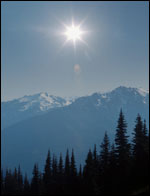Climate Climate & Energy
All Stories
-
Climate change in the mainstream press
National Geographic last month became the latest national magazine to place climate change on its cover, publishing one of the strongest series of pieces on the topic yet to appear in a mainstream publication. You can view free excerpts here, but will have to pay a visit to your trusty library to read the whole issue. Be sure to check out the note from the magazine's editor in chief, Bill Allen, in which he explains why he felt compelled to run the stories even though he anticipates a lot of angry reaction to them. "Some readers will even terminate their memberships," Allen predicts.
Consider sending a letter to the editor commending the fella for his stiff spine. (The instructions say to include your name, address, and daytime phone.) Skeptic types like Patrick Michaels have been quick to lash back at Allen and the magazine.
When I first received notice of the 74-page series, I wondered whether National Geographic would lead with the term global warming or with climate change, the phrase now in vogue in many political and scientific circles. The magazine has it both ways. Allen goes with global climate change, but Tim Appenzeller, the publication's senior editor for science, and Dennis R. Dimick, its senior editor for environment and technology, begin their introduction to the series with the very words global warming. The magazine fronts the headline "Global Warning: Bulletins from a Warmer World" over a fiery picture of an Alaskan forest aflame.
-
Cheese-Eating Efficiency Monkeys
France has made big strides in energy efficiency After the global oil crises of the 1970s, both the U.S. and France took steps to increase energy efficiency and reduce their […]
-
Little Red Tibet
Tibet suffers melting glaciers and nuclear dumpage As if living under the heel of a repressive communist neighbor wasn’t bad enough, Tibet now has to contend with a coming ecological […]
-
Da!
Russian government approves Kyoto; treaty now likely to go into effect After years of mixed messages, coy feints, and internal drama, the Russian government at last approved the Kyoto Protocol […]
-
An excerpt from Feeling the Heat sizes up the ominous Asian Cloud
The Indian city of Mumbai, formerly Bombay, is home to one of Asia's largest slums and endures among the worst air quality on earth. Half the city's population lacks running water or electricity, and the smoke from countless wood-burning cooking fires joins with the acrid haze from two-stroke auto rickshaws, diesel buses, and coal-fired power plants to all but choke the city. Breathing Mumbai's air, reports the Lonely Planet travel guide, is equivalent to smoking 20 cigarettes a day. Comparable air quality wraps New Delhi, Bangalore, and 69 of India's 70 principal cities year-round, according to a 1997 study by India's Central Pollution Control Board.
-
Baked Alaskans
Global warming is destroying Eskimo villages While debates over the “precautionary principle” and economic tradeoffs take place down in the cozy lower 48, global warming is entirely less abstract to […]
-
Go West, Young Pollutocrat!
Bush administration makes big push for oil and gas drilling in West With unprecedented speed, the Bush administration has opened vast swaths of environmentally sensitive land in the West to […]
-
Like a Tundra of Bricks
Arctic tundra may produce rather than absorb CO2, accelerating warming It’s not often that drama emerges from the Arctic tundra, but there seems to be genuine excitement around revelations from […]
-
Global dimming? Global warming? What’s with the globe, anyway?
Raise a toast to solar radiation. The director of the Zurich-based World Radiation Monitoring Center, the organization that measures the amount of solar radiation hitting the ground around the globe, […]
-
Sturm Und Dang
Climate change and urbanization lead to more natural-disaster fatalities Thanks to global warming and the increasing concentration of the earth’s denizens in densely populated urban centers, more and more people […]

